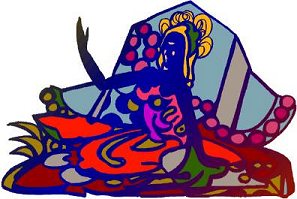Understanding Menopause Ayurvedically
By: Jean Clark
According to ayurveda, the total lifespan of an individual can be defined in
terms of the three doshas or ayurvedic principles: childhood is governed by
Kapha dosha, youth and adulthood by Pitta and mature adulthood, the last
trimester, by Vata dosha. Menopause marks the transition from the Pitta phase
of life to the Vata phase of life for most women.
"During the transition, women tend to experience imbalance in both Pitta and
Vata," explains Rama Kant Mishra, ayurvedic expert. "As a result, they can
exhibit the symptoms of an imbalanced Pitta — skin eruptions, depressed
emotions, irritability, hot flashes and excess stomach acid, for example, as
well as the signs of an imbalanced Vata - vaginal dryness, a clouded mind and
thin dry skin, to name a few. To have a smooth transition, it is important to
find out which of these two doshas is out of balance and correct that
imbalance with a proper diet and routine, and herbal supplements as support."
Some tips for balancing Vata:
A Vata balancing diet includes more of the sweet, sour and salty tastes, and
should contain more warm, unctuous foods. Eat three regular meals every day,
with the heaviest meal being lunch. Include a little Ghee in your diet and
cook with Vata balancing spices. Drink lots of water through the day.
With the too-much-to-do, too-little-time syndrome ruling the lives of many
women these days, going to bed at a reasonable hour each night appears a
luxury. If you are one of those women who habitually stays up late to catch
up on work, you might want to consider the fact that one of the simplest ways
to help keep Vata dosha in balance is to try to go to bed early: definitely
no later than 10 p.m. Between 6 p.m. and 10 p.m. is the Kapha dominated time
of day, which means the body is settling down and the brain is calming down
naturally. So if you go to sleep during that time you tend to have deeper,
more restful sleep.
Introduce the pleasurable experience of abhyanga, the ayurvedic self-massage,
into your daily routine. The daily warm oil massage is best done in the
morning, before your bath or shower. It pacifies both Vata and Pitta doshas,
helps increase resistance to day-to-day stress, enhances circulation and
lubrication, and recharges you for the day ahead.
It is important to balance Prana Vata, which governs the mind. The ayurvedic
herbs Brahmi, Aloeweed, Gotu Kola and Ashwagandha all restore balance to the
mind.
Some tips for balancing Pitta:
In general, a Pitta pacifying diet would be one that is rich in vegetables —
not tomatoes and spinach, which are two very heating vegetables, but most
other vegetables, whole grains, sweet juicy fruits, especially pears, plums
and other non-citrus fruits. Drink plenty of water through the day, or sip
two to three cups of an herbal tea which contains a cooling blend of spices
and rose petals.
Eat meals on time. Lunch, the main meal of the day, should ideally be eaten
around mid-day, when the digestive fire is at its natural peak. Include Rose
Petal Preserve in your diet for its cooling properties.
To keep Sadhaka Pitta, which governs the emotions, in balance, take Arjuna,
the ayurvedic herb famous for its positive influence on the heart. In
combination with other herbs, Arjuna helps promote better mind/body/heart
coordination and nourishes the heart and mind.

Note: This information is educational, and is not intended to replace
standard medical care or advice.For more information on the ayurvedic approach to menopause, please visit http://www.mapi.com/index.html
This article is brought to you by:

~ Susun Weed's Wise Woman Web ~